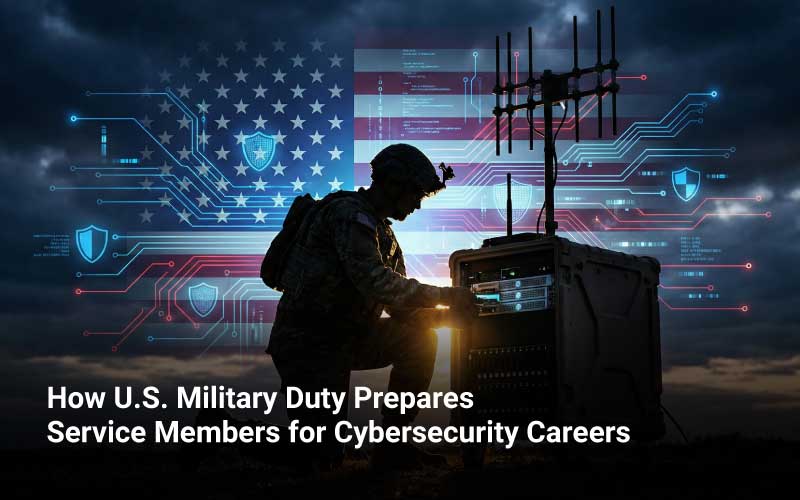The Digital Battlefield Shaping Today’s U.S. Military Members
U.S. Military personnel no longer operate solely in traditional physical battlefields. Modern warfare increasingly takes place in the digital realm, where hostile forces attempt to infiltrate networks, disrupt communication systems, and compromise mission-critical intelligence. Service members across every branch, whether in operations, cybersecurity, communications, or intelligence, regularly engage with these cyber threats as part of their mission readiness. This exposure places them in a uniquely strong position for civilian cybersecurity careers. The discipline, precision, situational awareness, and technical aptitude demanded in military cyber operations form a powerful foundation for various in-demand roles in the cybersecurity workforce. Many service members are already performing tasks that mirror the responsibilities of highly trained cybersecurity professionals.
This article outlines the top cyber scenarios that U.S. Military personnel encounter, explains how these experiences translate into civilian cybersecurity expertise, and highlights the importance of earning cybersecurity degrees from a VA-approved institution, such as EC-Council University (ECCU), for military members aspiring to enter or advance in the cybersecurity field.
The Top 5 Digital Battlefield Scenarios U.S. Military Personnel Face
Scenario 1: Defending Mission-Critical Systems Against Advanced Persistent Threats (APTs)
- Service members frequently work with systems targeted by sophisticated adversaries. Whether protecting command-and-control infrastructure or safeguarding classified intelligence networks, they encounter the digital equivalent of high-level enterprise cyber warfare on a daily basis. The constant vigilance required to identify and respond to APTs mirrors the challenges faced by civilian cybersecurity teams in government, defense contracting, and major corporations.
Scenario 2: Operating Secure Communication Networks Under Pressure
- Secure and uninterrupted communication is essential for mission success. Military personnel learn to configure, maintain, and defend communication networks, including satellite links, digital channels, radios, and secure data lines. These responsibilities reflect the core work of network security engineers and cybersecurity analysts who ensure system integrity and uptime for critical operations outside the military.
Scenario 3: Responding to Real-Time Cyber Incidents
- Throughout their service, military personnel frequently respond to anomalies, suspicious system behavior, or potential intrusions. They follow structured incident response protocols designed to minimize damage, restore functionality, and prevent further compromise. This mirrors the exact processes used by civilian Security Operations Centers (SOCs) and incident response teams.
Scenario 4: Conducting Risk Assessments and Security Audits
- Risk evaluation is a constant part of military operations, both physical and digital. Service members participate in system audits, vulnerability assessments, and mission risk reviews. These tasks align closely with civilian roles, such as cybersecurity auditors, governance, risk, and compliance (GRC) analysts, and information security managers.
Scenario 5: Participating in Red Team and Blue Team Cyber Exercises
- The military frequently conducts advanced cyber simulations to test defensive and offensive capabilities. Red teams simulate adversaries to identify vulnerabilities, while blue teams reinforce system defenses. These exercises prepare military personnel with hands-on experience in penetration testing, threat hunting, and proactive cyber defense techniques that are highly valued in the cybersecurity industry.
Here’s Retired Major Timothy Amerson’s Advice on Why Cybersecurity is an Ideal Career Path for U.S. Military Members.
How These Scenarios Translate Into Cybersecurity Career Success
In many cases, U.S. Military service members enter civilian cybersecurity with more hands-on experience than their non-military counterparts. The real-world cyber challenges they face equip them with skills and knowledge that transfer seamlessly into mainstream cybersecurity roles.
Here’s how:
1) Defending Against APTs = Strength in Threat Intelligence and Enterprise Security
Exposure to state-sponsored digital adversaries gives military personnel practical experience in threat detection, analysis, and mitigation. This mirrors civilian positions such as:
- Threat Intelligence Analyst
- Cybersecurity Engineer
- Security Analyst
- Network Defense Specialist
Their familiarity with high-pressure environments helps them develop strong decision-making and rapid response capabilities.
2) Securing Communications = Excellence in Network and Infrastructure Security
The ability to secure mission-critical communication channels is directly applicable to protecting corporate networks, cloud infrastructures, and enterprise communication systems. Service members are trained to uphold confidentiality, integrity, and availability, which are the cornerstones of cybersecurity.
3) Incident Response Protocols = SOC Readiness
Military personnel are accustomed to acting decisively and following structured procedures during high-stakes incidents. This makes them natural fits for:
- SOC Analysts
- Incident Responders
- Digital Forensics Investigators
Their ability to stay calm under pressure is a major advantage in these roles.
4) Risk Assessments = Strength in Governance, Risk & Compliance (GRC)
Experience evaluating operational risks and enforcing standards prepares service members for roles that require a thorough understanding of cybersecurity policy, risk management, and compliance oversight.
5) Red/Blue Team Exercises = Skilled Offensive and Defensive Cyber Practitioners
Military cyber exercises foster proficiency in identifying vulnerabilities, testing defenses, and thinking like an adversary. These skills are essential for:
- Penetration Testers
- Ethical Hackers
- Vulnerability Analysts
- Threat Hunters
Why a Cybersecurity Degree Is Essential to Validate and Enhance Military Experience
Although military experience provides unmatched practical exposure, the cybersecurity industry relies heavily on formal academic qualifications to validate expertise. A cybersecurity degree serves as the bridge between military skills and recognized civilian credentials.
A degree provides:
- Industry-recognized validation of military experience
- Eligibility for senior and leadership roles
- Knowledge aligned with frameworks such as NICE, ISO, and more
- In-depth theoretical foundations to complement hands-on skills
- Higher earning potential and broader career pathways
Military experience nurtures core capabilities, while a cybersecurity degree enhances and formalizes them. This creates a powerful combination that positions veterans for long-term career success.
Why ECCU Is the Best Choice for U.S. Military Personnel Seeking Cybersecurity Careers
For service members seeking to strengthen their cybersecurity careers through education, EC-Council University (ECCU) stands out as an accredited VA-approved institution. ECCU offers military students:
- VA-Approved Programs Eligible for GI Bill® Benefits: U.S. Military members can use the full range of their GI Bill® benefits at ECCU, making education accessible and affordable.
- A Cybersecurity-Focused University: All ECCU degrees, from bachelor’s to master’s programs, are purpose-built to prepare learners for in-demand cybersecurity job roles.
- Integrated Industry Certifications: Programs include opportunities to earn world-renowned EC-Council certifications, such as CEH, CND, and CHFI, as part of the curriculum.
- 100% Online Flexibility: ECCU’s online programs accommodate deployments, long-duty hours, and unpredictable schedules, allowing service members to progress toward a degree without career disruption.
- Leadership-Focused, Career-Oriented Education: ECCU emphasizes executive decision-making, strategic thinking, and cybersecurity leadership. These skills are vital for roles such as Cybersecurity Manager, SOC Lead, Information Security Architect, or even Chief Information Security Officer (CISO).
For U.S. Military personnel preparing for future careers in cybersecurity, ECCU provides the ideal combination of academic rigor, flexibility, and veteran-focused support.
Understand the differences in GI Bill® benefits for veterans and active-duty service members.
In Summary
The digital battlefield is an integral part of modern military operations, and the cyber scenarios encountered by U.S. Military personnel provide exceptional preparation for civilian cybersecurity careers. These experiences develop technical expertise, operational discipline, and strategic thinking, as well as other qualities that employers value.
By pairing this experience with a VA-approved cybersecurity degree from EC-Council University (ECCU), service members gain the academic validation and industry alignment needed to excel in numerous cybersecurity roles. ECCU’s specialized programs, flexible online format, and integration of world-class certifications make it the ideal institution for military personnel transitioning into the cybersecurity field. Service members already possess the mindset and skills required for this career path. With the right qualifications, they can leverage that experience to achieve long-term success as cybersecurity professionals.
For personalized guidance on how to use GI Bill® benefits to earn a degree at ECCU, you can:
Disclaimer: EC-Council University is approved by the U.S. Department of Veterans Affairs to accept GI Bill® education benefits, but is not endorsed by the VA.







